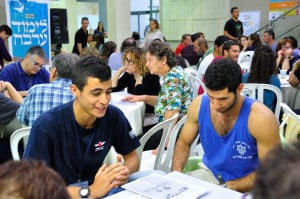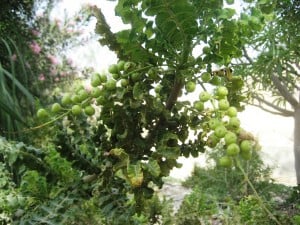This article first appeared in the Jerusalem Post “Metro” section on February 26, 2016. Reprinted with permission
Expanding minds and grappling with pluralism in the Arava
By Hannah Katsman
Nobel Prize-winning chemist Dan Shechtman, former education minister Shai Piron and Rabbi Dr. Benny Lau, founder of the 929 Project encouraging daily Bible study, were among the better-known speakers at the eighth Limmud Arava conference held last week in Sapir.
Organizers were aiming to help bridge schisms in Israeli society through shared study of a range of topics including society, politics, Judaism, security, economics, science, culture and art, presented through a pluralistic, Jewish-Israeli lens.
At the Arava conference, 500 religious, secular and traditional participants from the area and throughout Israel discussed contemporary and scholarly topics, including society, politics, arts and culture, in an attempt to encourage broad, free and pluralistic discourse in the picturesque beauty of the desert.
Professor Dan Shechtman. Credit: Gila Tal
FOR THE first time, Limmud Arava included programming for children in first through sixth grades.
Yael Melzer from Hatzeva, who organized the children’s program, said they got the idea last year. Children getting out of school just as the adults were headed to Limmud expressed disappointment that they couldn’t attend. Later, Melzer learned that other Limmud conferences featured children’s programs.
“Many parents of young children were able to attend for the first time,” explains Melzer, “because in the Arava, children don’t study on Fridays.”
The children’s track, called Limmud Kids, opened with “secular” Rabbi Ilana Levi, who described her talk as limmud al limmud, or learning about learning. She explained to the children that instead of teaching them, they would learn from each other, and divided them into groups to discuss a passage from the Mishna.
Shechtman, a professor at the Technion and winner of the Nobel Prize in chemistry, answered the children’s questions.
“He described how a gift of a magnifying glass piqued his curiosity about the world around him,” says Melzer, “and urged them to ask their parents to help them access tools like magnifying glasses and microscopes.
He also encouraged them to pay attention in school, learning from anyone who is willing to teach them.”
While sessions covered a wide range of topics, including aerodynamics, all of the speakers connected to Jewish themes. A short workshop on baking bread included a discussion of the commandment of separating halla (a portion of dough given to the priests) and its connection in the Torah to the settlement of the Land of Israel.
Finally, Rabbi Elkana Cherlow, a resident of Yeroham and member of the Orthodox rabbinical organization Beit Hillel, spoke to the children about the clothing of the high priest described in the week’s Torah portion, connecting it to a clown costume and Purim. (In a recent editorial on the NRG website, Cherlow addressed criticism for participating in a conference with rabbis of other denominations, saying that Jewish texts should be accessible to everyone, and that “no one has a monopoly on the Torah.”) Limmud Arava also benefited from students studying in local pre-army academies.
Jesse Milman of Ra’anana, 18, immigrated from Los Angeles with his parents two years ago. His pre-army program in Paran consists of 32 men and women from both religious and secular backgrounds. In addition to studying Jewish texts, they learn about desert agriculture and volunteer in Eilat.
Milman and other students at the Paran and Hatzeva academies led small groups of participants in studying a series of texts on pursuing peace. He and a friend were put in charge of a table.
“The material was heavy, and it was cool that they gave us the responsibility of leading a group of much older students,” says Milman.
He feels that the location gives the academies and the conference a unique flavor.
“The Arava is an extreme kind of place. There is something about the dryness of the desert that creates a thirst for learning,” he says.
IN ADVANCE of Limmud Arava, Metro spoke with two of the presenters, Rabbi Benny Lau and Rabbi Mani Gal, who have very different religious outlooks.
Gal grew up in Jerusalem and, with his father, attended early meetings surrounding the formation of Har El, the first Reform congregation in Israel. After the army, he moved to Ein Gedi. Although a secular kibbutz, early members instituted more religious practice than was usual in other kibbutzim. For example, meat and dairy were never served together in the communal dining room, though the kibbutz kept only one set of dishes.
Organizers of Jewish programming on the kibbutz noticed Gal’s musical talent and invited him to participate, and he eventually took charge of Shabbat and holiday programming, as well as Jewish study sessions.
About 10 years ago he received ordination as a rav hiloni, or secular rabbi, from Temurah, the Israeli equivalent of the Jewish humanistic movement in the United States founded by Rabbi Sherman Wine.
Temurah has ordained 30 rabbis, more than its American counterpart, and has as many as 20 students in the pipeline.
“I was greatly enriched by my studies,” Gal tells Metro. “I want to preserve the culture of Judaism. I perform weddings and funerals, sometimes as part of the kibbutz hotel’s framework. For instance, children can celebrate their bar mitzva in the nearby ancient synagogue.”
He also performs weddings throughout Israel, using original material.
“The weddings are Jewish, but secular,” he explains. “I learn about the family and design a Jewish ceremony that respects the participants instead of mocking them.”
He also lectures at various batei midrash (Jewish study halls) around the country.
Currently, Temurah ordainees are mainly involved with designing religious ceremonies for holidays and life-cycle events, as well as educational curricula. But they have other ambitions.
“One of the goals of Temurah is to get involved with conversions. There shouldn’t be a council of sages,” Gal insists.
“People can decide for themselves,” he continues. “We help candidates deepen their knowledge of Judaism, and we will conduct an appropriate ceremony. No one has the right to decide who is a Jew – in other words, the complete opposite of the approach in Israel today. We are entering this carefully as it is so explosive, but there is a huge audience looking for this.”
But is there room for God in a secular or humanistic approach to Judaism? Gal insists that secular Judaism is not atheism.
“Even among observant Jews, there are varying approaches to belief in God,” he states. “He may be viewed as simplified, abstract or concrete. I’m leading a session at Limmud [Arava] about poets and secular thinkers on God, and the concept is a very important part of my philosophy.”
At the gathering, Gal spoke about the queen of Sheba in the Book of Kings, including sources from history, folklore, archeology, art, botany and fantasy.
“Kibbutz Ein Gedi has a botanic garden in which myrrh, frankincense and henna have been growing continuously for 1,000 years,” he says. “These plants originated in the land of Sheba, which is now Yemen and Ethiopia. The text mentions that the queen brought spices. I don’t take every word of the Bible literally, but I see it as historical. Perhaps the plants of Ein Gedi are descendants of the seeds or sprouts brought by the queen of Sheba.”
Lau, who leads the Orthodox Ramban Synagogue in the Jerusalem neighborhood of Katamon, founded the Beit Midrash Letzedek (Study Hall for Justice) in order to focus on social themes within the study of Torah. He also established Startup 929, the program promoting daily Bible study whose name is based on the number of chapters in the Bible.
At Limmud, he spoke about Elijah in the Carmel, the chapter in Kings that was studied that day as part of 929.
Lau defines himself as Orthodox and recognizes the difficulty that many have with the role of women in Orthodoxy.
“In Jewish law, there are strict boundaries about the separation of men and women during prayer,” he tells Metro. “I live within these boundaries. Outside of the synagogue, men and women are equal in every way – in learning Torah, leadership and professions. The only difference is regarding prayer.”
He mentions women’s prayer groups, Simhat Torah for women and “a sea full of options.” When asked about partnership minyanim, in which women read from the Torah but are separated from men by a mehitza (partition), he says: “This is not the case in my synagogue.”
Recently, a place was set aside at the Western Wall for the non-Orthodox to hold mixed services.
“The decision is a tragedy,” Lau says of the decision. “When one group doesn’t recognize another, they must separate. There are now two ‘kotels’ for the nation of Israel. A balance should have been found. Liberal Jews and the Women of the Wall could be assigned their own hours instead of splitting the Kotel in two.”
When asked about his goal for Jewish society, Lau says: “We must return to learning a lot of Torah. It is our heritage, and we should learn without any judgment about who is religious and who is secular. Torah adds content to our lives. And we have to be present wherever anyone wants to learn Torah.”
BAT-SHEVA AMIR, 60, of Eilat, has been attending Limmud Arava gatherings for the past five years.
“I was on vacation in Tel Aviv because my husband is away, but returned early especially for Limmud. Seeing the lecturers, like Elkana Cherlow and Zohar Raviv [international vice president of education for Taglit-Birthright Israel] is like meeting old friends,” she enthuses.
You may also be interested in:
Expanding Minds and Grappling with Pluralism in the Arava
March 15, 2016 by 1 Comment


Thanks for sharing. Thanks for sharing . I have no difficulty with a pluralistic discussion on various issues with someone also presenting what he considers a Torah approach to the issue. I disagree with R’ Cherlow . The first Mishnah in pirkei Avot is very much concerned about protecting the integrity and authenticity of the Torah and through it the integrity of the Jewish people. Bible study is available to everyone , even non-Jews. Giving a legitimacy to reform or secular approaches to the Torah threatens the integrity of the Torah and the Jewish people. When people have me over for a meal , it is kosher , when I discuss Torah , the discussion and the people need to be kosher as well. Imho, this type of event without giving a platform to secular or reform Jews on Torah issues can contribute , but as it is , it is a departure from the consensus and does not respect the views of the vast majority of frum Jews